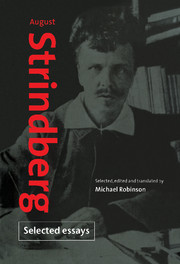Book contents
- Frontmatter
- Contents
- Notes on the text
- Introduction
- from Vivisections (1887)
- ‘The Battle of the Brains’
- ‘Nemesis Divina’
- ‘Mysticism – For Now’
- ‘Soul Murder (Apropos Rosmersholm)’
- ‘On Modern Drama and Modern Theatre’ (1889)
- from Vivisections II (1894)
- ‘Césarine’ (1894)
- ‘Deranged Sensations’ (1894)
- ‘In the Cemetery’ (1896)
- from Jardin des Plantes (1896)
- ‘On the Action of Light in Photography’ (1896)
- ‘A Glance into Space’ (1896)
- ‘Edvard Munch's Exhibition’ (1896)
- ‘The Synthesis of Gold’ (1896)
- ‘Contemporary Gold-Making’ (1896)
- ‘The Sunflower’ (1896)
- ‘The Mysticism of World History’ (1903)
- ‘August Strindberg on Himself’ (1909)
- Notes and commentary
- Index
‘Soul Murder (Apropos Rosmersholm)’
Published online by Cambridge University Press: 18 December 2009
- Frontmatter
- Contents
- Notes on the text
- Introduction
- from Vivisections (1887)
- ‘The Battle of the Brains’
- ‘Nemesis Divina’
- ‘Mysticism – For Now’
- ‘Soul Murder (Apropos Rosmersholm)’
- ‘On Modern Drama and Modern Theatre’ (1889)
- from Vivisections II (1894)
- ‘Césarine’ (1894)
- ‘Deranged Sensations’ (1894)
- ‘In the Cemetery’ (1896)
- from Jardin des Plantes (1896)
- ‘On the Action of Light in Photography’ (1896)
- ‘A Glance into Space’ (1896)
- ‘Edvard Munch's Exhibition’ (1896)
- ‘The Synthesis of Gold’ (1896)
- ‘Contemporary Gold-Making’ (1896)
- ‘The Sunflower’ (1896)
- ‘The Mysticism of World History’ (1903)
- ‘August Strindberg on Himself’ (1909)
- Notes and commentary
- Index
Summary
Even if there are no absolute truths, every age always has its average truth, the normal common sense of the period, its obligatory way of thinking, or so-called public opinion. Someone who is above or below the norm is regarded as ‘not quite all there’. Thus, Galileo was not quite all there when he opposed the public opinion of his time and assumed that the earth revolved around the sun. Thus, Ibsen's Rosmersholm is obscure to the theatregoer and a mystery to the half-educated, but quite intelligible to someone who has the necessary grounding in modern psychology.
When an average human being hears a new idea he is momentarily at a loss as to whether it is he or the man with the idea who is mad; usually he assumes that the other person is the crazy one because anyone who does not think for himself has, on precisely that account, an extremely strong belief – in himself. It is therefore very easy to gain a reputation for being mad. To the not so highly educated, everything that deviates from the norm is insane, and on the continent the derision that children, both large and small, direct at the English on account of their unusual clothes and behaviour is based upon the immature conviction that they are mad.
The gulf between lunatics and the sane is in many cases an inconsiderable one, and a mere five years ago quite modern French writers were including speculations about a perpetuum mobile and a universal language among the symptoms of insanity.
- Type
- Chapter
- Information
- August Strindberg: Selected Essays , pp. 64 - 72Publisher: Cambridge University PressPrint publication year: 1996



